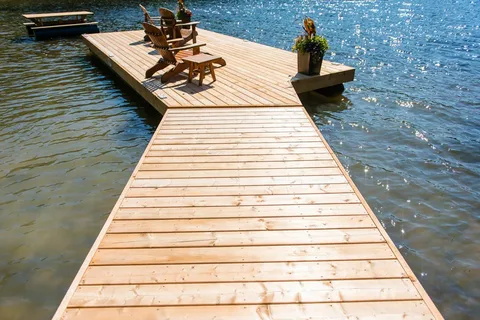Choosing a docking station is something more than just choosing a design. The type of material you will be choosing for the docking construction plays an essential role in the dock design.
To ensure that you are equipped with the best floating docks, there are several considerations that you should bear in mind, such as the costs, durability, materials, efficiency, upkeep, damage risks, etc.
The good thing about the docking system is that you will have a lot of options, whether you are building a fixed or a floating dock. There are dock types such as a plastic floating dock, wood docks, and aluminum docks. These are amongst the top three materials that are famous in the market.
Though these can offer a reliable and stable platform, they have their own sets of benefits. Most people do not know about their different uses, do not worry. We offer the best guide on different material types of docking systems that you can choose for yourself.
Table of Contents
Wood Docks
Wood docks are one of the standard dock system materials that come with its benefits and perks such as:
-
Cost
This type of docking material depends on the wood type you want to use. Different woods have different pricing tags, such as the Hardwood price differs from the cedarwood. Whereas, when you want to use the synthetic woods, these will be much more accessible at a much higher cost and can reach up to 40$/sq.ft.
-
Environmental Impact
The good thing about the wood material is that they are fully renewable resources and produce less air and water pollution than the other docking systems. But there are woods made with the pressure-treated, potentially polluting the water.
-
Damage Risks
For the woods, termites are the great enemy. The same goes for the wooden docks. Termites will be the expected risk for the wood docks and decking. But other types of insects can also cause damage to the untreated wood, such as the carpenter ants, carpenter bees, and powderpost beetles.
-
Upkeep
Painting and sealing the wooden docks will not be the permanent solution. When the wood is severely exposed to freshwater, saltwater, or rain, it will rot or degrade eventually. You will also need the maintenance for the pressure-treated lumber from time to time to prevent the degradation of components.
-
Durability
Wooden docks made from pressure-treated wood have a lifespan of more than 15 years when maintained. However, wood will always be inclined to rot, split, warp, or break even with regular maintenance.
Plastic Docks
Before building the plastic docks, it is imperative to know more about them for the most efficiency.
-
Cost
Wooden or fixed docks will be costly in the long term, but you will save money when you have the plastic floating docks. Other than that, these are portable and made with extreme durability. It will be the best investment you will make, and you will not have to worry about the repairs and part replacement.
-
Environmental Impacts
The metal or the wooden docks can potentially pollute the water. Still, the plastic ports are made with an eco-friendly dock with recyclable superior plastic that will not harm the environment.
-
Damage Risks
You will have the ability to secure the stationary plastic docks to the body of the water floor or land to get more stability. But the drawback of it will be the severe weather conditions such as the waves and water swells as they can easily knock the vessel against the dock.
It can potentially cause severe damage. With the help of the plastic floating docks, you will reduce the chances of injuries caused by hurricanes.
-
Upkeep
Many people also use the floating docks to add rapid shutdown solar, making it efficient for those who have solar panels at home. You will have the ability to maintain the docks and decking more quickly than other wood or aluminum docks options.
You will have to clean the deck with the help of sweeping to get the dock’s beauty. You can also use soap and water to clean it and remove stains.
-
Durability
These are made with robust and solid materials to survive when exposed to water for a long time. Unlike the wood docks, these will not rot or break in the freshwater or saltwater.
How Does Floating Dock Work?
These come with the ability to float in water and are unsinkable. In other words, floating docks can stay on the water regardless of the water stability as they follow the movement of water waves with the help of ebbs and tides flow. When installing them, you will have to connect them to shore using the gangway.
The good thing about the floating docks is that you can easily remove the sections when the weather is not correct, or the maintenance is needed.
Conclusion
Docks are the best option if you are looking for something to enhance the property’s look and feel. You can also work with some jackets manufacturer to get the best jacket according to the occasion to make you stand out from the rest.

